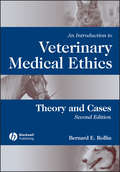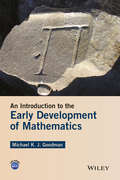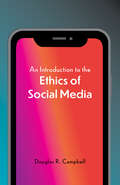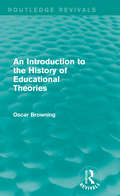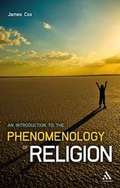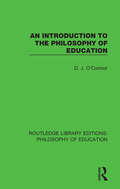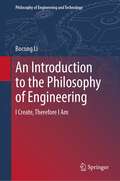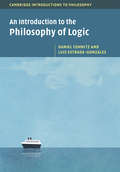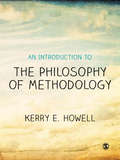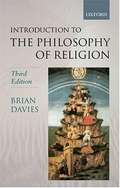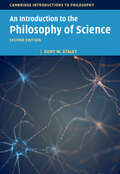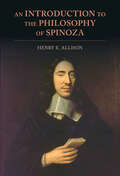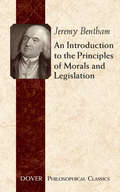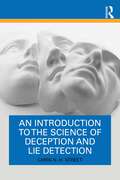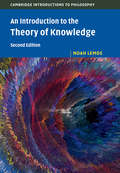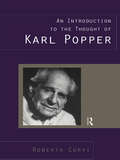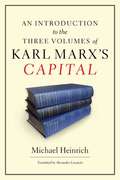- Table View
- List View
An Introduction to Veterinary Medical Ethics
by Bernard E. RollinOne of the most difficult issues that confronts veterinarians and staff today concerns the profession's obligation to the animal and the sometimes conflicting demands from clients, peers and society. The veterinarian's role has become more complex with new ethical challenges posed by issues such as growing public awareness regarding animal welfare, increasing economic value of companion animals, growth of veterinary specialization, experimentation with alternative and complementary medicine, and concern for pain management and mental well-being of animals. Written by an acknowledged pioneer in veterinary ethics, An Introduction to Veterinary Medical Ethics addresses the ethical challenges that veterinarians face daily as they seek to balance obligations to animal, client, peers, society and self. The book offers a highly readable and approachable introduction to the nature of ethical theory, reasoning and decision-making, and its practical application to veterinary medicine. Now with over 100 real-life veterinary case histories and analysis, this edition also includes new discussions of animal pain, distress and happiness, ethics of critical care, alternative medicine, legal status and value of animals, and Aesculapian authority. An Introduction to Veterinary Medical Ethics: Theory and Cases, Second Edition is recommended as essential reading for all veterinary students and practitioners, as well as those interested in general animal welfare. New edition from an acknowledged pioneer in veterinary ethics; Addresses ethical challenges that veterinary medicine, with over 100 real-life cases; Includes new discussion of legal status and value of animals, alternative medicine, Aesculapian authority, ethics and critical care, and animal pain, distress and happiness; Ideal for veterinary students and practitioners
An Introduction to the Early Development of Mathematics
by Michael K. GoodmanAn easy-to-read presentation of the early history of mathematics Engaging and accessible, An Introduction to the Early Development of Mathematics provides a captivating introduction to the history of ancient mathematics in early civilizations for a nontechnical audience. Written with practical applications in a variety of areas, the book utilizes the historical context of mathematics as a pedagogical tool to assist readers working through mathematical and historical topics. The book is divided into sections on significant early civilizations including Egypt, Babylonia, China, Greece, India, and the Islamic world. Beginning each chapter with a general historical overview of the civilized area, the author highlights the civilization’s mathematical techniques, number representations, accomplishments, challenges, and contributions to the mathematical world. Thoroughly class-tested, An Introduction to the Early Development of Mathematics features: Challenging exercises that lead readers to a deeper understanding of mathematics Numerous relevant examples and problem sets with detailed explanations of the processes and solutions at the end of each chapter Additional references on specific topics and keywords from history, archeology, religion, culture, and mathematics Examples of practical applications with step-by-step explanations of the mathematical concepts and equations through the lens of early mathematical problems A companion website that includes additional exercises An Introduction to the Early Development of Mathematics is an ideal textbook for undergraduate courses on the history of mathematics and a supplement for elementary and secondary education majors. The book is also an appropriate reference for professional and trade audiences interested in the history of mathematics. Michael K. J. Goodman is Adjunct Mathematics Instructor at Westchester Community College, where he teaches courses in the history of mathematics, contemporary mathematics, and algebra. He is also the owner and operator of The Learning Miracle, LLC, which provides academic tutoring and test preparation for both college and high school students.
An Introduction to the Ethics of Social Media
by Douglas Campbell"Doug Campbell lays out a comprehensive and fair-minded account of both the benefits and the drawbacks of social media for our era. He attaches these evaluations to both the individual and to society as a whole. The case studies are compelling and exhibit a keen awareness of the current moment. How should we live, now that many or even most of us are at least partially online? Campbell addresses this question from the point of view of privacy, attention, politics, misinformation, online ostracism, online friendship, and the potential benefits of simply quitting social media or at least some of its more pernicious platforms. Along the way, Campbell ties his discussions back to philosophical concerns raised by Plato, Aristotle, and Xunzi, among others. He also connects his discussion with recent work in feminist philosophy. And each chapter concludes with a succinct definition of key terms and suggested case studies and discussion topics that will engage students at all levels. An impressive accomplishment, and one that deserves a place in the classroom." —Mark Alfano, Macquarie University
An Introduction to the History of Educational Theories (Routledge Revivals)
by Oscar BrowningAn Introduction to the History of Educational Theories, first published in 1881, offers a comprehensive overview of the most notable approaches to education throughout Western history, from Athens and Rome to the Victorian public school. Exploring not only the still famous theories of Plato and Aristotle, this work also touches on techniques in education which are either no longer prevalent – Roman Oratory, the Jesuits – or in some cases were never widely adopted or appreciated: John Milton, for example. This title will be of value to those intrigued by the potential of past attitudes for present-day application, as well as to those unconvinced by contemporary approaches.
An Introduction to the Language of Mathematics
by Frédéric MynardThis is a textbook for an undergraduate mathematics major transition course from technique-based mathematics (such as Algebra and Calculus) to proof-based mathematics. It motivates the introduction of the formal language of logic and set theory and develops the basics with examples, exercises with solutions and exercises without. It then moves to a discussion of proof structure and basic proof techniques, including proofs by induction with extensive examples. An in-depth treatment of relations, particularly equivalence and order relations completes the exposition of the basic language of mathematics. The last chapter treats infinite cardinalities. An appendix gives some complement on induction and order, and another provides full solutions of the in-text exercises. The primary audience is undergraduate mathematics major, but independent readers interested in mathematics can also use the book for self-study.
An Introduction to the Phenomenology of Religion
by James L. CoxIn this revised edition, the author provides an easily accessible introduction to the phenomenology of religion, which he contends continues as a foundational method for the academic study of religion in the twenty-first century. After dealing with the problematic issue of defining religion, he describes the historical background to phenomenology by tracing its roots to developments in philosophy and the social sciences in the early twentieth century. The phenomenological method is then outlined as a step-by-step process, which includes a survey of the important classifications of religious behavior. The author concludes with a discussion of the place of the phenomenology of religion in the current academic climate and argues that it can be aligned with the growing scholarly interest in the cognitive science of religion.
An Introduction to the Philosophy of Art
by Richard EldridgeRichard Eldridge's compact survey of philosophical theories of the nature and significance of art draws on materials from classical and contemporary philosophy as well as literary theory and art criticism. Eldridge explores the representational, expressive, and formal dimensions of art, and argues that works of art present their subject matter as creations of enduring cognitive, moral, and social interest. His accessible study will be of interest to students and anyone interested in the relationship between thought and art.
An Introduction to the Philosophy of Education (Routledge Library Editions: Philosophy of Education #14)
by D. J. O'ConnorEducation, like every other important branch of knowledge, has its underlying philosophical problems. It is these problems and the attempts to solve them which together make up the philosophy of education. This book, first published in 1957, provides a simple explanation and illustration of what philosophy can (and cannot) do for educational thinking. This title will be of interest to students of the philosophy of education.
An Introduction to the Philosophy of Engineering: I Create, Therefore I Am (Philosophy of Engineering and Technology #39)
by Bocong LiThis book is the first academic work on the philosophy of engineering in China that reflects two decades of research. It puts forward a new thesis, namely that the core maxim in the philosophy of engineering is “I create, therefore I am,” which is radically different from the Cartesian maxim: “I think, therefore I am.” In addition, the book offers the first detailed portrait of the roots and evolution of the philosophy of engineering in China. The book begins by discussing the triptych thesis of science, technology and engineering, which argues that there are a number of important distinctions between the three, e.g. scientific activities are chiefly based on discovery, while technological activities center on invention, and engineering activities focus on creation. Considering the latest developments in the philosophy of engineering, the author also analyzes engineering communities, engineering practice and a micro–meso–macro framework. In subsequent chapters, the author separately analyzes the three stages of engineering activities: planning, operating and using artifacts. In the closing chapter, two views on the philosophy of engineering (as a new subdiscipline of philosophy and as a philosophy in its own right) are briefly explained.
An Introduction to the Philosophy of Language
by Michael MorrisIn this textbook, Michael Morris offers a critical introduction to the central issues of the philosophy of language. Each chapter focusses on one or two texts which have had a seminal influence on work in the subject, and uses these as a way of approaching both the central topics and the various traditions of dealing with them. Texts include classic writings by Frege, Russell, Kripke, Quine, Davidson, Austin, Grice and Wittgenstein. Theoretical jargon is kept to a minimum and is fully explained whenever it is introduced. The range of topics covered includes sense and reference, definite descriptions, proper names, natural-kind terms, de re and de dicto necessity, propositional attitudes, truth-theoretical approaches to meaning, radical interpretation, indeterminacy of translation, speech acts, intentional theories of meaning, and scepticism about meaning. The book will be invaluable to students and to all readers who are interested in the nature of linguistic meaning.
An Introduction to the Philosophy of Logic (Cambridge Introductions to Philosophy)
by Daniel Cohnitz Luis Estrada-GonzálezPhilosophy of logic is a fundamental part of philosophical study, and one which is increasingly recognized as being immensely important in relation to many issues in metaphysics, metametaphysics, epistemology, philosophy of mathematics, and philosophy of language. This textbook provides a comprehensive and accessible introduction to topics including the objectivity of logical inference rules and its relevance in discussions of epistemological relativism, the revived interest in logical pluralism, the question of logic's metaphysical neutrality, and the demarcation between logic and mathematics. Chapters in the book cover the state of the art in contemporary philosophy of logic, and allow students to understand the philosophical relevance of these debates without having to contend with complex technical arguments. This will be a major new resource for students working on logic, as well as for readers seeking a better understanding of philosophy of logic in its wider context.
An Introduction to the Philosophy of Mathematics
by Mark ColyvanThis introduction to the philosophy of mathematics focuses on contemporary debates in an important and central area of philosophy. The reader is taken on a fascinating and entertaining journey through some intriguing mathematical and philosophical territory, including such topics as the realism/anti-realism debate in mathematics, mathematical explanation, the limits of mathematics, the significance of mathematical notation, inconsistent mathematics and the applications of mathematics. Each chapter has a number of discussion questions and recommended further reading from both the contemporary literature and older sources. Very little mathematical background is assumed and all of the mathematics encountered is clearly introduced and explained using a wide variety of examples. The book is suitable for an undergraduate course in philosophy of mathematics and, more widely, for anyone interested in philosophy and mathematics.
An Introduction to the Philosophy of Methodology
by Kerry E HowellThis book provides students with a concise introduction to the philosophy of methodology. The book stands apart from existing methodology texts by clarifying in a student-friendly and engaging way distinctions between philosophical positions, paradigms of inquiry, methodology and methods. Building an understanding of the relationships and distinctions between philosophical positions and paradigms is an essential part of the research process and integral to deploying the methodology and methods best suited for a research project, thesis or dissertation. Aided throughout by definition boxes, examples and exercises for students, the book covers topics such as: - Positivism and Post-positivism - Phenomenology - Critical Theory - Constructivism and Participatory Paradigms - Post-Modernism and Post-Structuralism - Ethnography - Grounded Theory - Hermeneutics - Foucault and Discourse This text is aimed at final-year undergraduates and post-graduate research students. For more experienced researchers developing mixed methodological approaches, it can provide a greater understanding of underlying issues relating to unfamiliar techniques.
An Introduction to the Philosophy of Psychology
by Fred Adams Daniel A. WeiskopfPsychology aims to give us a scientific account of how the mind works. But what does it mean to have a science of the mental, and what sort of picture of the mind emerges from our best psychological theories? This book addresses these philosophical puzzles in a way that is accessible to readers with little or no background in psychology or neuroscience. Using clear and detailed case studies and drawing on up-to-date empirical research, it examines perception and action, the link between attention and consciousness, the modularity of mind, how we understand other minds, and the influence of language on thought, as well as the relationship between mind, brain, body, and world. The result is an integrated and comprehensive overview of much of the architecture of the mind, which will be valuable for both students and specialists in philosophy, psychology, and cognitive science.
An Introduction to the Philosophy of Religion
by Michael J. Murray Michael C. ReaAn Introduction to the Philosophy of Religion provides a broad overview of the topics which are at the forefront of discussion in contemporary philosophy of religion. Prominent views and arguments from both historical and contemporary authors are discussed and analyzed. The book treats all of the central topics in the field, including the coherence of the divine attributes, theistic and atheistic arguments, faith and reason, religion and ethics, miracles, human freedom and divine providence, science and religion, and immortality. In addition it addresses topics of significant importance that similar books often ignore, including the argument for atheism from hiddenness, the coherence of the doctrines of the Trinity and the Incarnation, and the relationship between religion and politics. It will be a valuable accompaniment to undergraduate and introductory graduate-level courses.
An Introduction to the Philosophy of Religion (Third Edition)
by Brian Davies<p>The third edition of An Introduction to the Philosophy of Religion provides a critical examination of some fundamental questions posed by religious belief: What does belief in God amount to? Can God's existence be proved? Is there life after death? <p>Brian Davies considers these questions and many others, sometimes offering provocative answers of his own, but more often giving readers room to each independent conclusions. He explains how a range of thinkers have approached the subject -- including Anselm, Aquinas, Descartes, Leibniz, Hume, and Kant -- and also discusses how contemporary author now engage with the issues involved. Completely revised to cover the latest developments in the field, the new edition of this established textbook will prove the ideal introduction for all students of the philosophy of religion.</p>
An Introduction to the Philosophy of Science
by Kent W. StaleyThis book guides readers by gradual steps through the central concepts and debates in the philosophy of science. Using concrete examples from the history of science, Kent W. Staley shows how seemingly abstract philosophical issues are relevant to important aspects of scientific practice. Structured in two parts, the book first tackles the central concepts of the philosophy of science, such as the problem of induction, falsificationism, and underdetermination, and important figures and movements, such as the logical empiricists, Thomas Kuhn, and Paul Feyerabend. The second part turns to contemporary debates in the philosophy of science, such as scientific realism, explanation, the role of values in science, the different views of scientific inference, and probability. This broad yet detailed overview will give readers a strong grounding whilst also providing opportunities for further exploration. It will be of particular interest to students of philosophy, the philosophy of science, and science.
An Introduction to the Philosophy of Science (Cambridge Introductions to Philosophy)
by Kent W. StaleyThis thoroughly updated second edition guides readers through the central concepts and debates in the philosophy of science. Using concrete examples from the history of science, Kent W. Staley addresses questions about what science is, why it is important, and the basis for trust in scientific results. The first part of the book introduces the central concepts of philosophy of science, with updated discussions of the problem of induction, underdetermination, rationality, scientific progress, and important movements such as falsificationism, logical empiricism, and postpositivism, together with a new chapter on social constructionism. The second part offers updated chapters on probability, scientific realism, explanation, and values in science, along with new discussions of the role of models in science, science in policy-making, and feminist philosophy of science. This broad yet detailed overview will give readers a strong grounding in philosophy of science whilst also providing opportunities for further exploration.
An Introduction to the Philosophy of Spinoza
by Henry E. AllisonAimed at those new to studying Spinoza, this book provides a comprehensive introduction to his thought, placing it in its historical and philosophical contexts, and assessing its critical reception. In addition to providing an analysis of Spinoza's metaphysical, epistemological, psychological, and ethical views in the Ethics, Henry Allison also explores his political theory and revolutionary views on the Bible, as well as his account of Judaism, which led to the excommunication of the young Spinoza from the Jewish community in Amsterdam. Although the book's main focus is on the analysis of Spinoza's views, including a close reading of the central arguments of the Ethics, it also considers many of the standard objections to these arguments as well as possible responses to them. This completely revised and updated new edition of Allison's classic book, with two new chapters, will help a new generation of students to understand and value Spinoza's work.
An Introduction to the Principles of Morals and Legislation (Barnes And Noble Library Of Essential Reading)
by Jeremy BenthamFirst published in 1789, Jeremy Bentham's best-known work remains a classic of modern philosophy and jurisprudence. Its definitions of the foundations of utilitarian philosophy and its groundbreaking studies of crime and punishment retain their relevance to modern issues of moral and political philosophy, economics, and legal theory.Based on the assumption that individuals seek pleasure and avoid pain, Bentham's utilitarian perspective forms a guide to moral decision-making. With the "greatest happiness of the greatest number" as his objective, the author attempts to identify the sources and varieties of pleasure and pain as well as the ways in which they can be measured in assessing moral options. Considerations of intentionality, consciousness, motives, and dispositions support Bentham's arguments. The text concludes with his survey of purpose and the role of law and jurisprudence, a fascinating exercise in the theory of social reform that explores conflicts between the interests of the majority and individual freedom.
An Introduction to the Science of Deception and Lie Detection
by Chris N. StreetThis accessible book provides a foundational understanding of the science of deception and lie detection. Focusing on core issues for the field, it discusses classic and current psychological research into lying as well as theoretical approaches to understanding human lie detection. This book explores engaging questions around how people lie, how people make decisions about believing others, and how we can detect deception. Each chapter is clearly structured to support students of all levels by summarising content, presenting key research, and systematically evaluating findings. Chapters explore topics including some of the most promising current lie detection techniques, how and why people lie, how lying develops in children, and whether unconscious thinking can boost lie detection accuracy. Providing an overview of key issues in deception, this book will be of great interest to students and lecturers in the field of deception and lie detection, as well as anyone generally interested in this fascinating field of research.
An Introduction to the Theory of Knowledge
by Noah LemosA clear and accessible introduction to epistemology or the theory of knowledge.
An Introduction to the Theory of Knowledge (Cambridge Introductions to Philosophy)
by Noah LemosNow revised and containing three new chapters, this book provides a clear and accessible introduction to epistemology, or the theory of knowledge. It discusses some of the main theories of justification, including foundationalism, coherentism, reliabilism, and virtue epistemology. Other topics include the Gettier problem, internalism and externalism, skepticism, the problem of epistemic circularity, a priori knowledge, naturalized epistemology, and the epistemic significance of testimony and disagreement. Intended primarily for students taking their first classes in epistemology, this lucid and well-written text will provide an excellent introduction to anyone interested in knowing more about this important area of philosophy.
An Introduction to the Thought of Karl Popper
by Roberta CorviThis is a comprehensive introduction to the philosophical and political thought of Karl Popper, now available in English. It is divided into three parts; the first part provides a biography of Popper; the second part looks at his works and recurrent themes, and the third part assesses his critics. It was approved of by Popper himself as a sympathetic and comprehensive study, and will be ideal to meet the increasing demand for a summary introduction to his work.
An Introduction to the Three Volumes of Karl Marx's Capital
by Michael Heinrich Alex LocascioThe global economic crisis and recession that began in 2008 had at least one unexpected outcome: a surge in sales of Karl Marx's Capital. Although mainstream economists and commentators once dismissed Marx's work as outmoded and flawed, some are begrudgingly acknowledging an analysis that sees capitalism as inherently unstable. And of course, there are those, like Michael Heinrich, who have seen the value of Marx all along, and are in a unique position to explain the intricacies of Marx's thought. Heinrich's modern interpretation of Capital is now available to English-speaking readers for the first time. It has gone through nine editions in Germany, is the standard work for Marxist study groups, and is used widely in German universities. The author systematically covers all three volumes of Capital and explains all the basic aspects of Marx's critique of capitalism in a way that is clear and concise. He provides background information on the intellectual and political milieu in which Marx worked, and looks at crucial issues beyond the scope of Capital, such as class struggle, the relationship between capital and the state, accusations of historical determinism, and Marx's understanding of communism. Uniquely, Heinrich emphasizes the monetary character of Marx's work, in addition to the traditional emphasis on the labor theory of value, this highlighting the relevance of Capital to the age of financial explosions and implosions.
